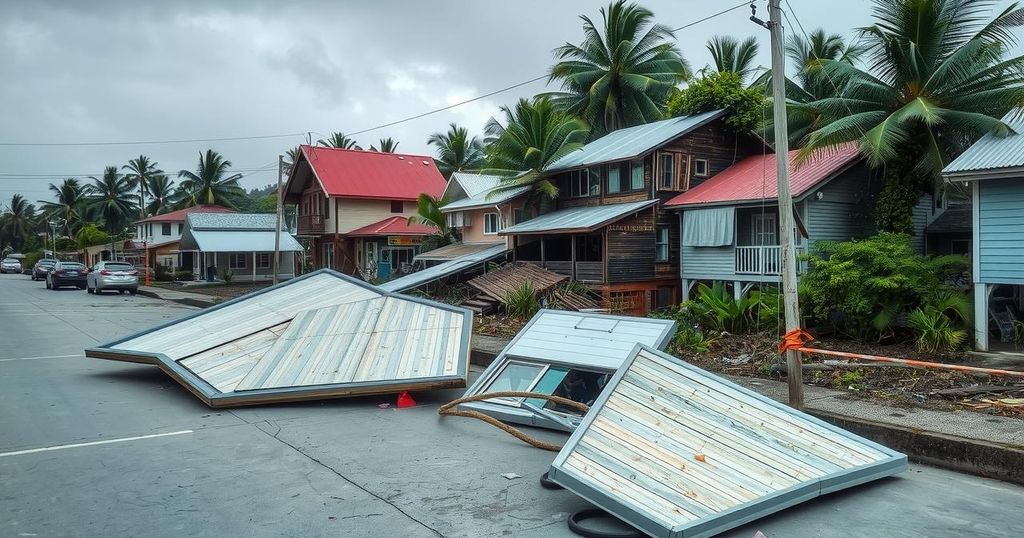Tropical Cyclone Chido: A Historic Devastation in Mayotte
Tropical Cyclone Chido struck Mayotte on December 14, 2023, with winds over 200 km/h, resulting in unprecedented devastation. The storm prompted national mourning in France, as initial reports indicated hundreds might have lost their lives. Timely warnings issued by Météo-France did not prevent the heavy toll due to the cyclone’s unusual trajectory and the island’s unpreparedness for such severe weather events.
On December 14, 2023, Tropical Cyclone Chido struck the island of Mayotte in the Indian Ocean with devastating intensity. Wind speeds exceeded 200 km/h, accompanied by gusts reaching over 225 km/h, marking this event as the strongest storm to hit Mayotte in the last 90 years, as reported by Météo-France. The cyclone brought torrential rain, with 176 mm falling in just 12 hours, and dangerously high seas with wave heights exceeding 5 meters. The severity of the storm led to significant destruction, including damage to Météo-France’s observational infrastructure.
In response to the tragedy, French President Emmanuel Macron declared a national day of mourning. Initial reports indicated that hundreds might have perished on the island, which is ill-prepared for cyclones of such magnitude, particularly due to the prevalence of informal housing structures. Disturbingly, this high loss of life occurred despite timely warnings; Météo-France issued an amber alert 50 hours prior to landfall, escalating to a red alert the evening before, and finally a violet alert shortly before the cyclone made landfall.
Chido’s trajectory was unusual as it bypassed Madagascar, which could have diminished its strength, and instead impacted Mayotte directly with full force. After hitting Mayotte, the cyclone made landfall in Mozambique on December 15, causing heavy rainfall across both Mozambique and Malawi. Météo-France noted the difficulty in assessing the role of climate change in this context, stating, “Our current state of knowledge doesn’t allow us to draw any conclusions about the role of climate change on the track of the cyclone and on its intensity.”
Furthermore, the WMO’s Regional Specialized Meteorological Centre for the South-West Indian Ocean had predicted an early onset to the cyclone season in their seasonal forecast released on October 31. This year’s forecast anticipated higher-than-normal activity with 9 to 13 cyclones expected, 4 to 7 of which could escalate to full tropical cyclone status. The impacts of Chido are addressed as a unique occurrence, given its rarity over the past nine decades, with experts urging further research into the factors contributing to its intensity and trajectory.
Mayotte, a small island in the Indian Ocean, is not typically accustomed to severe tropical cyclones, making the impact of Chido particularly catastrophic. Historical data indicates that the region has not experienced a storm of this scale for ninety years, highlighting the unusual nature of this event within the context of local climatology. As weather patterns may be influenced by larger climatic shifts, the conversation surrounding climate change remains crucial to understanding the future of tropical weather events in vulnerable regions like Mayotte and its neighboring areas. Météo-France serves as the official meteorological authority for the region, providing critical forecasting and alerts. Their operational capacity has been called into action during this cyclone, showcasing the importance of accurate and timely weather warnings in mitigating disaster impacts, particularly in regions with informal structures that cannot withstand severe weather conditions. The cyclone’s rare trajectory, by avoiding major landmasses, exemplifies the unpredictable nature of weather systems in this part of the world. Additionally, the forecasting ability of meteorological services is vital in planning for cyclone seasons, especially as predictions indicate an increase in activity for the upcoming seasons. This emphasizes a need for continual evaluation of potential risks and preparatory measures to safeguard vulnerable populations.
In summary, Tropical Cyclone Chido’s destructive passage through Mayotte underscores the challenges faced by the island in the face of extreme weather events. With wind speeds reaching catastrophic levels and heavy rainfall leading to loss of life and infrastructure, the cyclone’s impact was profound. The timely alerts issued by Météo-France, although accurate, highlight the persisting vulnerabilities in informal housing and emergency preparedness within such regions. Given the unprecedented nature of this disaster, further research is essential to determine how climatic factors may influence future cyclone behavior and impact communities in similar situations.
Original Source: wmo.int




Post Comment